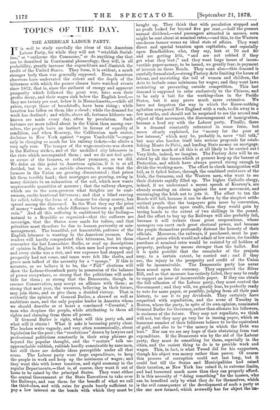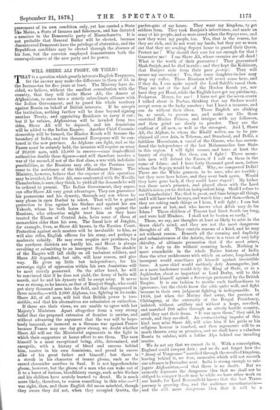TOPICS OF THE DAY.
THE AMERICAN LABOUR PARTY.
IT is well to study carefully the ideas of this American Labour Party, for while they will not "establish Social- ism," or " enthrone the Commune," or do anything else that can be described in Continental phraseology, they will, in all probability, greatly increase the expenditure and diminish the credit of the United States. They form, it is evident, a much stronger body than was generally supposed. Even American observers have underrated the extent and the depth of the bitterness with which the poorer classes have watched events since 1872, that is, since the outburst of energy and apparent prosperity which followed the great war, have seen their profits decay, and their wages sink below the English level,— they are twenty per cent. below it in Massachusetts,—while all prices, except those of breadstuffs, have been rising ; while taxation has fallen on them like a cloud ; while the demand for work has declined ; and while, above all, fortunes hitherto un- known are made every day, often by peculation. Such fortunes are more talked about in the Union than among our- selves, the people have an instinct in favour of equality of condition, and when Kearney, the Californian mob orator, declaims in New York against " rogue Vanderbilt "—rogue only in charging so much for his railway tickets—he elicits a very ugly roar. The temper of the wage-receivers was shown in the Railway strikes, and of the unskilled city labourers in the riots which accompanied them ; and we do not feel quite so secure of the farmers, or rather yeomanry, as we did. We defer on this point to American opinion, if it is at all decided, but to us, as outside observers, it seems that the farmers in the Union are growing discontented ; that prices hit them terribly hard ; that mortgages are growing, owing in many districts to an exhaustion of the soil, which now wants unprocurable quantities of manure ; that the railway charges, which are to the corn-growers what freights are to coal- owners, excite irrational bitterness ; and that a blind craving for relief, taking the form of a clamour for cheap money, has spread among the distressed. In the West they say the price of money " makes the whole difference between a profit and ruin." And all this suffering is embittered by the feeling— natural to a Republic so organised—that the sufferers are sovereign, that the States were made for toilers, and that privation must therefore be due to human perversity or mis- management. The beautiful, yet lamentable, patience of the English labourer is wanting to the American yeoman. Our readers will hardly comprehend this bitterness, but let them remember the last Lancashire Strike, or read up descriptions of opinion in England in 1818, when men had grown savage, and every strike was a riot, and war expenses had stopped and prosperity had not come, and taxes were felt like thefts, and grave men talked of the necessity for a "sponge." If this is accurate, as we believe it to be, the " Fall" elections will show the Labour-Greenback party in possession of the balance of power everywhere, so strong that the politicians will make bids for them ; so strong that the Democrats, though in essence Conservative, may accept an alliance with them ; so strong that next year, the waverers, believing in their future, may join them, and so give them a decided victory. That is evidently the opinion of General Butler, a shrewd as well as ambitious man, and the only popular leader in America whom we should describe as at heart a convinced " Cmsarist," a man who despises the people, while attributing to them all rights and claiming from them all power. If General Butler is right, what will this party ask, and what will it obtain ? What it asks is becoming pretty clear.
The leaders write vaguely, and very often nonsensically, about legislation for the poor ; the " resolutions " drawn by lawyers and professional politicians constantly in their crisp phrases go beyond the popular thought, and the " orators" talk un- approachable rubbish, rubbish hardly conceivable by sane men, but still there are definite ideas perceptible under all that scum. The Labour party want large expenditure, to keep the people in work and keep up the minimum of wages ; and they want this with lower taxation, and rigid economy in the regular Departments,—that is, of course, they want it out of loans to be raised by the principal States. They want either the central Government or the State Executives to take over the Railways, and run them for the benefit of what we call the third-class, and with rates for goods barely sufficient to pay a low interest on the bonds with which they must be bought up. They think that with peculation stopped and no profit looked for beyond five per cent.,—half the present normal dividend,—and passengers attracted in masses, corn might be sent about at nominal rates,—and this, to the Western one-horse farmer seems an ideal state of affairs. They want direct and special taxation upon capitalists, and especially upon Bondholders, who, they say, lent at 70 and 80' and are getting 105, " and are not robbed if they get what they lent ;" and they want large issues of incon- vertible paper-money, to be issued, we greatly fear, in payment of interest on these Bonds. They want also—this demand is carefully formulated,—strong Factory Acts limiting the hours of labour, and restricting the toil of women and children, the Acts to include some minimum for wages; and they want laws restricting or preventing outside competition. This last demand is supposed to refer exclusively to the Chinese, and to be only a bait for the working-class in the Pacific States, but it may prove much more extensive. We have not forgotten the way in which the Know-nothing- agitation conquered New England with a rush, to die away in a few months, and should not be surprised to see the second real object of that movement, the discouragement of immigration, become a loud cry with the Labour party. Finally, there is a demand constantly reiterated in some form, but never clearly explained, for "money for the poor at low interest," which may be, probably is, mere "tall talk," but may also harden itself into serious proposals for estab- lishing Monts de Piae, and lending State money on mortgage. Now how much of all this is at all likely to be carried out ? Very little, indeed, we imagine. The Factory Acts will be re- sisted by all the forces which at present keep np the banner of Protection, and which have always proved strong enough to divide the working-men. The effort to check immigration will fail, as it failed before, through the combined resistance of the Irish, the Germans, and the Western men, who want to see their districts rapidly filled up. The higher Catholic clergy, indeed, if we understand a recent speech of Kearney's, are- already sounding an alarm against the new movement, and encouraging the Irish not to join it. The effort to tax the Bonds will fail, because it can be shown by the simplest arith- metical proofs that the taxpayers gain more by conversion, which is dependent upon credit, than they would gain by taxing bonds to the extent of two shillings in the pound. And the effort to buy up the Railways will also probably fail, because it will irritate those great corporations, whose managers can exert such great electoral power, and because the people themselves profoundly distrust the honesty of their officials. Moreover, the railways, if purchased, must be pur- chased at prices which would not admit of low rates, for forcible purchase at nominal rates would be resisted by all holders of property, perhaps by means stronger than the ballot. But it is quite possible that the remainder of the projects may, to a certain extent, be carried out ; and if they are, the injury to the prosperity and credit of the Union will be inconceivable. The Democratic party has never been sound upon the currency. They supported the Silver Bill, and as that measure has entirely failed, they may be ready to support an issue of inconvertible paper. If they can obtain the full adhesion of the Labour party, they must control the Government ; and they will, we greatly fear, be perfectly ready to vote for more paper, or possibly, judging from all their past history, to use it to pay dividends. They certainly have coquetted with repudiation, and the scene of Tuesday in Boston, where the party, in spite of its own opinion, nominated General Butler for Governor, rather than alienate his followers, is ominous of the future. They may not repudiate, we think will not, but they may go very far in issuing paper, which an immense number of their followers believe to be the equivalent of gold, and also to be " the money in which the Debt was lent." Nor can we see any hope of their abstaining from vast expenditure. If the Democrats win by the aid of the Labour party, they must do something for them, especially in the cities, and the easiest thing to do is to provide work and wages. This, in fact, is what Tweed did for his supporters, though his object was money rather than power. Of course this process of corruption could not last long, but it could last till the States and Municipalities had raised their taxation, as New York has raised it, to extreme limits, and had borrowed much more than they can properly afford. It is this necessity of "doing something" for the masses, who can be benefited only by what they do for themselves, which is the evil consequence of the development of such a party as the one now formed, which avowedly has for object the
provement of its own condition only, yet has carried a State like Maine, a State of farmers and fishermen, and has dictated a nominee to the Democratic party of Massachusetts. It is not probable that General Butler will be elected, because discontented Democrats have the privilege of abstention, and the Republican candidate may be elected through the absence of 'his foes, but the coercion employed demonstrates both the -unscrupulousness of the new party and its power.































 Previous page
Previous page